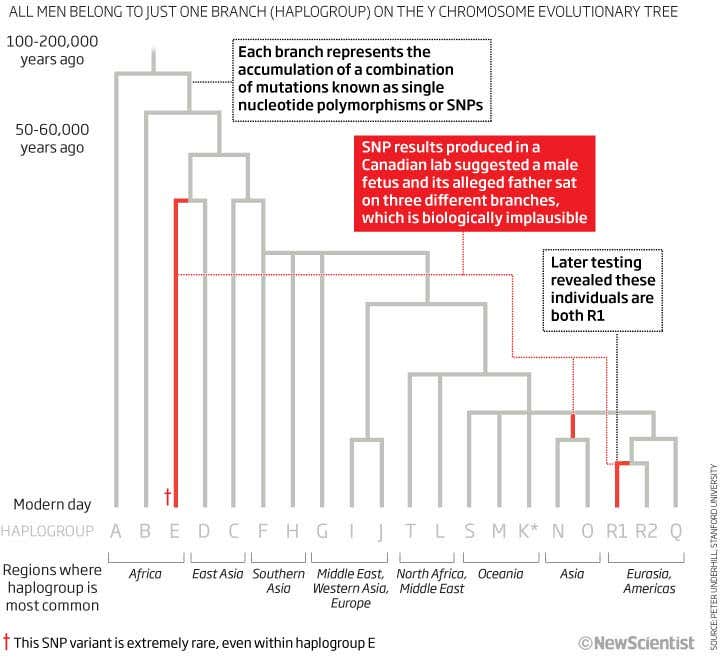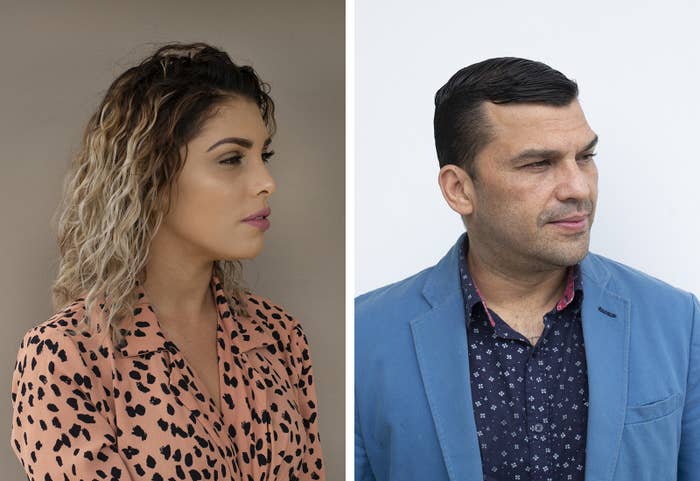THREAD: I spent almost a decade fighting a libel action to bring you this story. I hope it helps prevent further harm. https://www.buzzfeednews.com/article/peteraldhous/dna-paternity-test-health-genetic-center-libel">https://www.buzzfeednews.com/article/p...
2/ In December 2010, after an investigation spanning more than a year, I published this story @newscientist detailing problems with a prenatal paternity test offered by a company called the Health Genetic Center in Toronto, Canada https://www.newscientist.com/article/mg20827893-200-the-danger-of-unreliable-paternity-tests/">https://www.newscientist.com/article/m...
3/ I spoke to women who’d been given results contradicted by tests run subsequently by accredited testing labs. Their lives were upended. One came close to aborting her fetus, based on an incorrect result.
4/ Experts told me that some of HGC’s results were inconsistent with the known evolutionary history of the human Y chromosome, and explained how the company used too few genetic markers to give statistically reliable conclusions on paternity.
5/ We even submitted our own samples, from me, a male colleague, and my editor (a woman who had never been pregnant). HGC generated a DNA profile for the nonexistent fetus and indicated that I was its father.
6/ After the article appeared, HGC and its CEO, Yuri Melekhovets, sued for libel. Preparing for the eventual trial was a mammoth task. Our legal team submitted nearly 2,000 pages of evidence and written testimony.
7/ The trial was heard in Toronto in March and April 2018. Finally, in December 2018, my reporting was vindicated. “No matter how damaging or disparaging it may be to the plaintiffs, the truth can never be actionable,” the judge wrote in his ruling.
https://www.canlii.org/en/on/onsc/doc/2018/2018onsc7224/2018onsc7224.html?resultIndex=3">https://www.canlii.org/en/on/ons...
https://www.canlii.org/en/on/onsc/doc/2018/2018onsc7224/2018onsc7224.html?resultIndex=3">https://www.canlii.org/en/on/ons...
8/ HGC appealed, claiming bias, in part because our lead counsel offered the trial judge a cough drop. The appeal was thrown out in December 2019, and Canadian legal Twitter had some thoughts. https://twitter.com/jacobdamstra/status/1205830624906481664">https://twitter.com/jacobdams...
9/ HGC then sought leave to appeal to the Supreme Court of Canada. That was denied in April this year.
10/ My new story details another case, from 2017 in Costa Rica. When she learned she was pregnant, Yuliana Ramírez had no doubt Luis Diego Jiménez, her ex-boyfriend, was the father. HGC’s testing report said he wasn’t.
11/ After the baby was born, another test run by an internationally accredited Costa Rican government lab established with almost 100% certainty that Jiménez was the father.
12/ Melekhovets still rejects the ruling from my trial, blames a mixup of the samples in Costa Rica for the error in Ramírez’s test, and has threatened to sue me again.
13/ But if DNA testing was properly regulated, there would be no need to argue these issues in the libel courts. Paternity testing, done outside of a legal setting, remains a free-for-all that potentially puts unsuspecting customers at risk.
14/ My view: Accreditation and quality testing for labs that sell genetic tests to the public should be mandatory. And before a novel test can be put on the market, its validity should be established through rigorous scientific trials.
15/ Thanks to all who helped me in this fight, starting with our incredible legal team, pictured here with me L to R: Heyla Vettyvel, lead counsel Sandra Barton, and Erin Farrell of @gowlingwlg_ca. (Thanks also to Mark Hines, who did much of the early work on the case.)
16/ Thanks to the many scientific experts who testified in my trial, especially Denise Syndercombe Court of King’s College, London, and Bruce Budowle of the University of North Texas.
17/ Thanks to my former employer @newscientist, its former publisher @ReedBusinessInf, their libel insurers, Sue Charles of ACK Media Law in London, and my current employer @BuzzFeedNews, for unfailing support.
18/ But thanks, most of all, to the HGC customers who shared their stories with me. I hope this article helps prevent others from having a similar experience. https://www.buzzfeednews.com/article/peteraldhous/dna-paternity-test-health-genetic-center-libel">https://www.buzzfeednews.com/article/p...

 Read on Twitter
Read on Twitter




